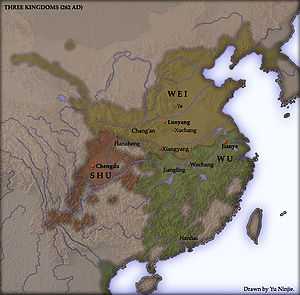263
From Wikipedia, the free encyclopedia
This article is about the year 263. For the number, see 263 (number). For other uses, see 263 (disambiguation).
| Millennium: | 1st millennium |
|---|---|
| Centuries: | 2nd century – 3rd century – 4th century |
| Decades: | 230s 240s 250s – 260s – 270s 280s 290s |
| Years: | 260 261 262 – 263 – 264 265 266 |
| 263 by topic | |
| Politics | |
| State leaders – Sovereign states | |
| Birth and death categories | |
| Births – Deaths | |
| Establishment and disestablishment categories | |
| Establishments – Disestablishments | |
| Gregorian calendar | 263 CCLXIII |
| Ab urbe condita | 1016 |
| Armenian calendar | N/A |
| Assyrian calendar | 5013 |
| Bahá'í calendar | −1581 – −1580 |
| Bengali calendar | −330 |
| Berber calendar | 1213 |
| English Regnal year | N/A |
| Buddhist calendar | 807 |
| Burmese calendar | −375 |
| Byzantine calendar | 5771–5772 |
| Chinese calendar | 壬午年 (Water Horse) 2959 or 2899 — to — 癸未年 (Water Goat) 2960 or 2900 |
| Coptic calendar | −21 – −20 |
| Discordian calendar | 1429 |
| Ethiopian calendar | 255–256 |
| Hebrew calendar | 4023–4024 |
| Hindu calendars | |
| - Vikram Samvat | 319–320 |
| - Shaka Samvat | 185–186 |
| - Kali Yuga | 3364–3365 |
| Holocene calendar | 10263 |
| Igbo calendar | −737 – −736 |
| Iranian calendar | 359 BP – 358 BP |
| Islamic calendar | 370 BH – 369 BH |
| Japanese calendar | N/A |
| Juche calendar | N/A |
| Julian calendar | 263 CCLXIII |
| Korean calendar | 2596 |
| Minguo calendar | 1649 before ROC 民前1649年 |
| Thai solar calendar | 806 |
| Wikimedia Commons has media related to 263. |

Three Kingdoms (China)
Year 263 (CCLXIII) was a common year starting on Thursday (link will display the full calendar) of the Julian calendar. At the time, it was known as the Year of the Consulship of Albinus and Dexter (or, less frequently, year 1016 Ab urbe condita). The denomination 263 for this year has been used since the early medieval period, when the Anno Domini calendar era became the prevalent method in Europe for naming years.
Events
By place
Roman Empire
- King Odenathus of Palmyra declares himself ruler of the area west of the River Euphrates and is declared Dux Orientalis by the Roman emperor Gallienus.
Asia
- The Wei Kingdom conquers the kingdom of Shu Han, one of the Chinese Three Kingdoms.
By topic
Arts and sciences
- Liu Hui writes a commentary on The Nine Chapters on the Mathematical Art, describing what will later be called Gaussian elimination, computing pi, etc.
Births
- Eusebius of Caesarea, Bishop of Caesarea (d. ca. 339).
Deaths
- Dong Jue, general of Shu
- Fu Qian, general of Shu
- Empress Guo, wife of Cao Rui
- Liu Chen, fifth son of Liu Shan
- Ruan Ji, poet and musician who lived in the late Eastern Han Dynasty
- Zhuge Shang, son of Zhuge Zhan, grandson of Zhuge Liang (b. 245)
- Zhuge Zhan, general of Shu, son of Zhuge Liang (b. 227)
- Zong Yu, Shu military and political leader
References
This article is issued from Wikipedia. The text is available under the Creative Commons Attribution/Share Alike; additional terms may apply for the media files.